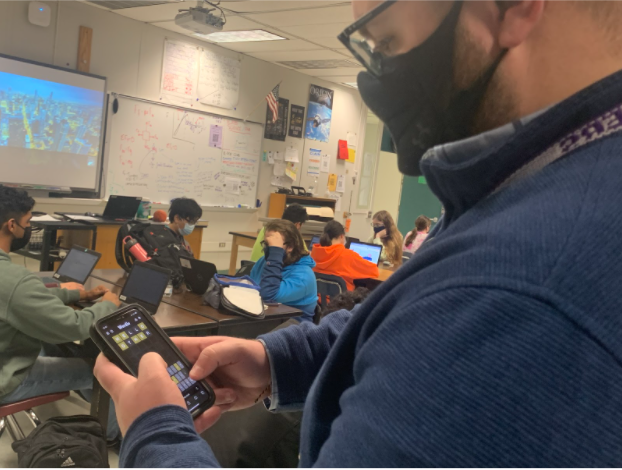Wordle takes over students’ mornings
Physics teacher Tanner DeCrapio plays Wordle as his students work in class.
March 7, 2022
The game that took the internet by storm, Wordle, has quickly escalated in popularity. Even though it was created as a learning game, many high school students can’t help but play it when their attention fades in class.
Wordle is a web-based word game created by Josh Wardle. The goal is to guess the five-letter word of the day within six attempts, and feedback in the form of colored tiles informs the player of where the tile belongs if it is in the puzzle. If the tile turns green, it means the letter is in the correct spot. Yellow means that the letter is correct, but belongs in a different location. Lastly, a gray box means the letter is not in the puzzle at all.
Since the game’s release in October 2021, there have been over 200 word puzzles for players to solve. According to The New York Times, on Nov. 1, only 90 people played. However, over two months after the release of the game, over 300,000 people played.
“I think that Wordle is beneficial because you can learn new words, and it enhances your vocabulary,” freshman Garrett Carper said.
According to the Interdisciplinary Center for Biotechnology Research, social psychologist Matt Baldwin has come up with scientific reasons for what makes Wordle addicting. It gives the player an “aha” moment, even if the player is wrong. Wordle is binge proof, with one puzzle a day. It also fits pandemic-addled minds, forcing the player to think outside the box to complete the challenge.
Wordle swept the internet overnight because of how simple it is to access and play. According to UChicago News, students can’t stop playing because of the validation it offers. It affirms intuitions about the English language when the correct answer is guessed. The thrill can also be from the hints it gives, letting the player know if they’re close to being accurate. If they are, they may not stop until the player gets the correct answer and feels victorious.
“Yes, [Wordle] helps me challenge myself,” junior Jayna Dorsey said. “You have to figure out what letter [goes] where and what spot the letter belongs to.”
The game has also turned into a competitive game between friends, who play against each other to get the best score. The quicker the player guesses the right word, the higher score they get.
“[Wordle] challenges me sometimes,” Carper said. “But most of the time it just clicks.”
According to WebMD, before Wordle was created, a study was conducted to examine the links between word puzzle habits and 14 cognitive measures, including attention and memory, in more than 19,000 adults from ages 50-93. Some had never played word puzzles, while others frequently did. The test results showed that those who never played word puzzles or did them only occasionally performed poorly compared to others who regularly completed puzzles.
“[On Feb. 15] the word was ‘cynic,’” sophomore Esther Yang said. I didn’t know what that meant and some people go out of their way to figure out the definition of these words, so I guess it’s growing my vocab in a way.”
According to National World, there are many different good strategy words to begin with to get off to a good start. They contain many vowels, because they are in so many words. Some popular starting words include audio, ouija, adieu, and auloi. While some of them may not even look like real words, many players use these words to get a good start in the game.
With over 15,000 5-letter word possibilities, and only six slots for six different words, Wordle can introduce students to new words and their meanings.
“I think especially with how fast-paced most games and content are nowadays, a one-word-a-day [policy] helps [Wordle’s] algorithms because it leaves people wanting to play it more,” Yang said. “It’s like reverse psychology.”



